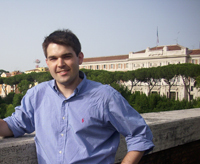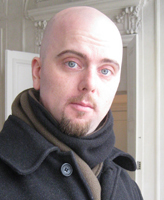Three doctoral students in Notre Dame’s Department of History have been named 2011 Fulbright Scholars. Max Deardorff, Nathan Gerth, and John Moscatiello will use their Fulbright funding in Russia and Spain to support research that spans education policy, government bureaucracy, and religion.
Sponsored by the U.S. Department of State’s Bureau of Educational and Cultural Affairs, the Fulbright Program was established in 1946 to increase cross-cultural understanding and facilitate educational and research opportunities for students, scholars, and professionals in the United States and more than 155 countries around the world.
Universal Education Program

A scholar of colonial Latin American and global history, Deardorff is writing his dissertation on the ways in which the church and state cooperated to create a universal educational program in 16th century Spain and its colonies.
“For the first time, the kings of Spain sought to implement a program that applied to every person who lived within the borders of their realms—an important transition in the relationships between individuals and the states of which they formed part,” he says. “This new, idealized citizenship was predicated upon the demonstration of Christian belief and the appropriation of Spanish cultural customs.”
In Spain, Deardorff will examine manuscripts at the National Library in Madrid and bureaucratic documents in the Archive of the Indies in Seville in an attempt to discover “whether the real, daily process of acculturation ever looked anything like the ideals mapped out in formal meetings.”
The Fulbright award, he says, “has greatly facilitated my work, since I will be able to concentrate on my archival research long enough to dig deep into the sources.”
Bureaucrats and State Power

Gerth will use his Fulbright grant to spend 10 months in Tver, Russia, a city northwest of Moscow. There, he will dig through archival documents—everything from criminal investigation reports to hospital and school records—to study the lives and work of provincial bureaucrats.
His dissertation explores how local bureaucracies laid the groundwork for a powerful modern state in Russia. “Examining their world,” Gerth says, “will help us further understand what changes in provincial society helped spark the major social upheavals that Russia experienced during the latter decades of the 19th century.”
The Fulbright program has proven to be an “invaluable” resource in a country where personal and institutional relationships are key, he adds.
“Russian archives are not a straightforward place to conduct research,” he says. “The Fulbright office in Moscow has already helped me overcome some of these difficulties by putting me in touch with the state university in Tver, along with several historians in the city.”
Medieval Spanish Life
Moscatiello focuses his doctoral work on medieval Iberia, social history, the history of Christianity, the history of the family, and domesticity. Last year, he chaired an international graduate student conference at Notre Dame called “From Iberian Kingdoms to Atlantic Empires: Spain, Portugal, and the New World, 1250–1700.”
“Our conference caught the attention of the editors of the Journal of Medieval Iberian Studies, who agreed to publish a special issue of the conference proceedings in 2012,” Moscatiello says, adding that one of the editors, Julio Escalona Monge, then offered to sponsor his application for a Fulbright to Spain.
In Madrid, Moscatiello will collaborate with scholars at the Consejo Superior de Investigaciones Científicas (Spanish National Research Council) to do archival investigations for his dissertation on the history of private life and domesticity in medieval Spain—specifically the everyday interactions between Muslims, Christians, and Jews. He will also be acting as a research specialist for the Council.
“As a cultural ambassador in the Fulbright program,” he says, “I hope that my work and community service help foster relations between American and Spanish scholars.”
Learn More >
- Department of History
- Max Deardorff graduate student page
- Nathan Gerth graduate student page
- John Moscatiello graduate student page
- Notre Dame Graduates Receive National Fellowships and Scholarships
- Six Notre Dame graduate students win Fulbright Awards in 2011 competition
- The Graduate School
- Fulbright Program
Originally published by at al.nd.edu on September 30, 2011.